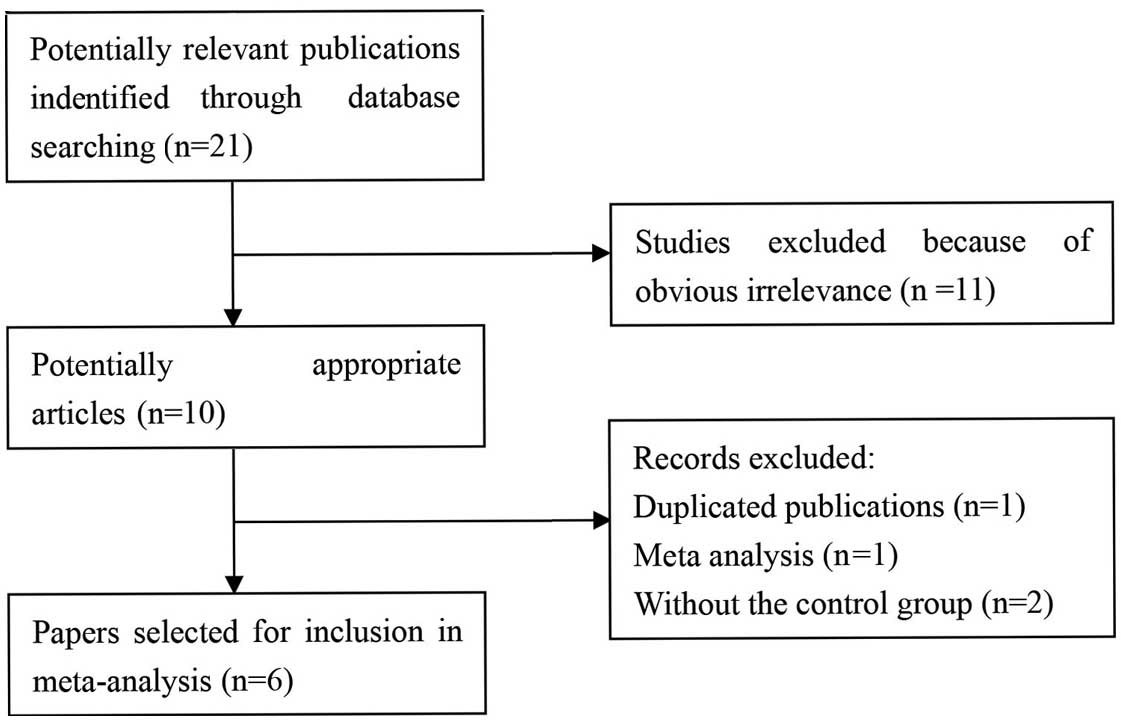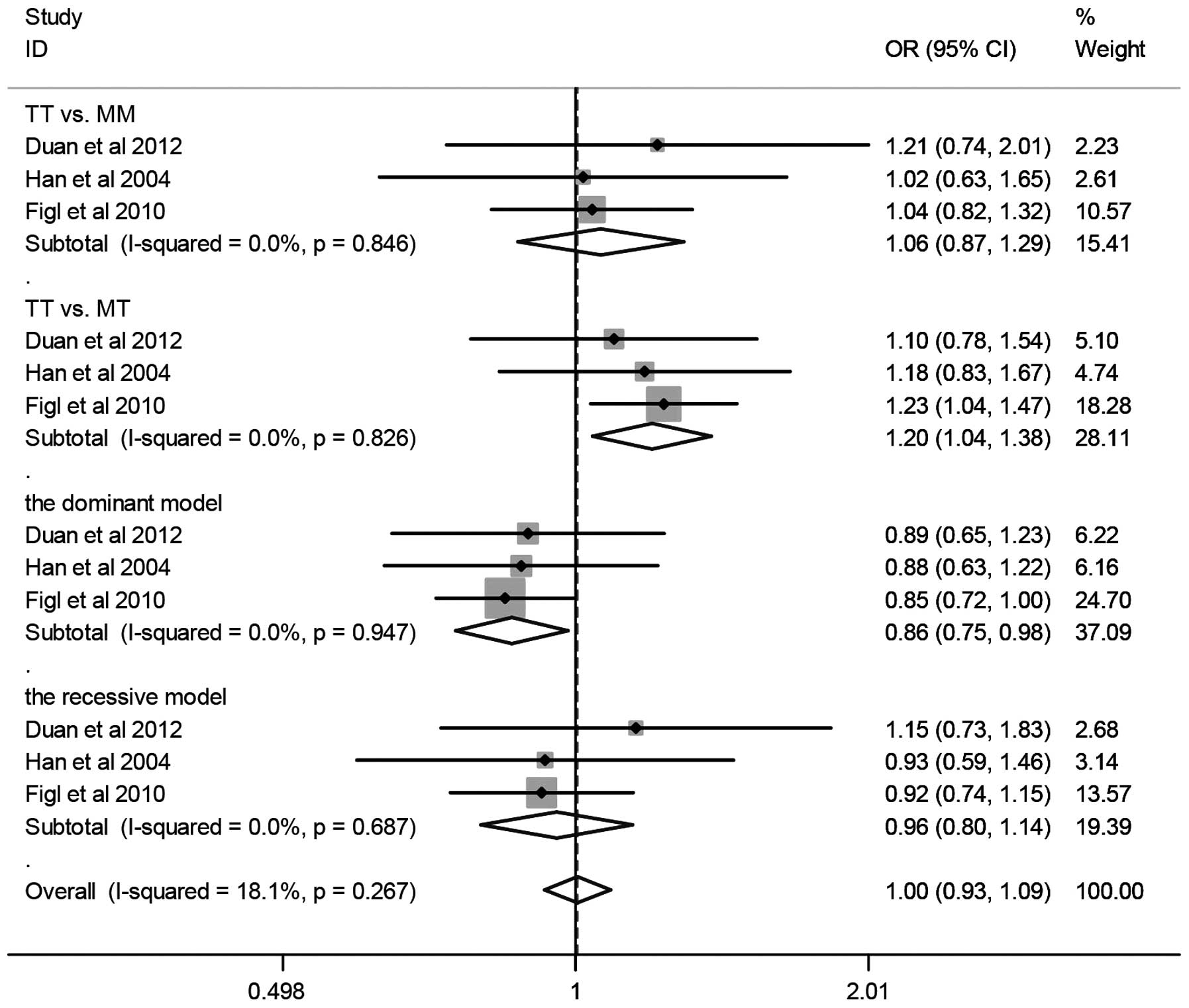|
1
|
Foster PJ, Dunn EA, Karl KE, et al:
Cellular magnetic resonance imaging: in vivo imaging of melanoma
cells in lymph nodes of mice. Neoplasia. 10:207–216. 2008.
View Article : Google Scholar : PubMed/NCBI
|
|
2
|
Matullo G, Palli D, Peluso M, et al:
XRCC1, XRCC3, XPD gene polymorphisms, smoking and (32)P. DNA
adducts in a sample of healthy subjects. Carcinogenesis.
22:1437–1445. 2001. View Article : Google Scholar : PubMed/NCBI
|
|
3
|
Glanz K, Buller DB and Saraiya M: Reducing
ultraviolet radiation exposure among outdoor workers: state of the
evidence and recommendations. Environ Health. 6:222007. View Article : Google Scholar : PubMed/NCBI
|
|
4
|
Elmets C and Mukhtar H: Ultraviolet
radiation and skin cancer: progress in pathophysiological
mechanisms. Dermatology Foundation. Prog Dermatol. 30:1–16.
1996.
|
|
5
|
Lehmann A: Dual functions of DNA repair
genes: molecular, cellular and clinical implications. Bioessays.
20:146–155. 1998. View Article : Google Scholar : PubMed/NCBI
|
|
6
|
Altieri F, Grillo C, Maceroni M, et al:
DNA damage and repair: from molecular mechanisms to health
implications. Antioxid Redox Signal. 10:891–937. 2008. View Article : Google Scholar : PubMed/NCBI
|
|
7
|
Brenneman MA, Weiss AE, Nickoloff JA, et
al: XRCC3 is required for efficient repair of chromosome breaks by
homologous recombination. Mutat Res. 459:89–97. 2000. View Article : Google Scholar : PubMed/NCBI
|
|
8
|
Matullo G, Guarrera S and Carturan S: DNA
repair gene polymorphisms, bulky DNA adducts in white blood cells
and bladder cancer in a case. control study. Int J Cancer.
92:562–567. 2001. View
Article : Google Scholar : PubMed/NCBI
|
|
9
|
Attia J, Thakkinstian A and D'Este C:
Meta-analyses of molecular association studies: methodologic
lessons for genetic epidemiology. J Clin Epidemiol. 56:297–303.
2003. View Article : Google Scholar : PubMed/NCBI
|
|
10
|
Higgins JP and Thompson SG: Quantifying
heterogeneity in a meta-analysis. Stat Med. 21:1539–1558. 2002.
View Article : Google Scholar : PubMed/NCBI
|
|
11
|
Winsey SL, Haldar NA, Marsh HP, et al: A
variant within the DNA repair gene XRCC3 is associated with the
development of melanoma skin cancer. Cancer Res. 60:5612–5616.
2000.PubMed/NCBI
|
|
12
|
Duan Z, Shen H, Lee JE, et al: DNA repair
gene XRCC3 241Met variant is not associated with risk of cutaneous
malignant melanoma. Cancer Epidemiol Biomarkers Prev. 11:1142–1143.
2002.PubMed/NCBI
|
|
13
|
Figl A, Scherer D, Nagore E, et al:
Single-nucleotide polymorphisms in DNA. repair genes and cutaneous
melanoma. Mutat Res. 702:8–16. 2010. View Article : Google Scholar : PubMed/NCBI
|
|
14
|
Goncalves FT, Francisco G, de Souza SP, et
al: European ancestry and polymorphisms in DNA repair genes modify
the risk of melanoma: a case. control study in a high UV index
region in Brazil. J Dermatol Sci. 64:59–66. 2011. View Article : Google Scholar : PubMed/NCBI
|
|
15
|
Bertram CG, Gaut RM, Barrett JH, et al: An
assessment of a variant of the DNA repair gene XRCC3 as a possible
nevus or melanoma susceptibility genotype. J Invest Dermatol.
122:429–432. 2004. View Article : Google Scholar : PubMed/NCBI
|
|
16
|
Han J, Colditz GA, Samson LD, et al:
Polymorphisms in DNA double-strand break repair genes and skin
cancer risk. Cancer Res. 64:3009–3013. 2004. View Article : Google Scholar : PubMed/NCBI
|
|
17
|
Leiter U and Garbe C: Epidemiology of
melanoma and nonmelanoma skin cancer. the role of sunlight. Adv Exp
Med Biol. 624:89–103. 2008. View Article : Google Scholar : PubMed/NCBI
|
|
18
|
Jiang Z, Li C, Xu Y, et al: A
meta-analysis on XRCC1 and XRCC3 polymorphisms and colorectal
cancer risk. Int J Colorectal Dis. 25:169–180. 2010. View Article : Google Scholar : PubMed/NCBI
|
|
19
|
Jiao L, Hassan MM, Bondy ML, et al: XRCC2
and XRCC3 gene polymorphism and risk of pancreatic cancer. Am J
Gastroenterol. 103:360–367. 2008. View Article : Google Scholar : PubMed/NCBI
|
|
20
|
Jin MJ, Chen K, Song L, et al: The
association of the DNA repair gene XRCC3 Thr241Met polymorphism
with susceptibility to colorectal cancer in a Chinese population.
Cancer Genet Cytogenet. 163:38–43. 2005. View Article : Google Scholar : PubMed/NCBI
|
|
21
|
Araujo FD, Pierce AJ, Stark JM, et al:
Variant XRCC3 implicated in cancer is functional in
homology-directed repair of double-strand breaks. Oncogene.
21:4176–4180. 2002. View Article : Google Scholar : PubMed/NCBI
|

















